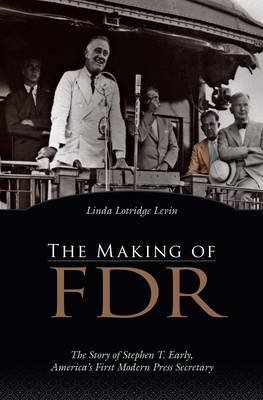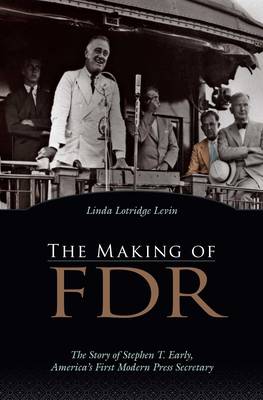
Bedankt voor het vertrouwen het afgelopen jaar! Om jou te bedanken bieden we GRATIS verzending (in België) aan op alles gedurende de hele maand januari.
- Afhalen na 1 uur in een winkel met voorraad
- In januari gratis thuislevering in België
- Ruim aanbod met 7 miljoen producten
Bedankt voor het vertrouwen het afgelopen jaar! Om jou te bedanken bieden we GRATIS verzending (in België) aan op alles gedurende de hele maand januari.
- Afhalen na 1 uur in een winkel met voorraad
- In januari gratis thuislevering in België
- Ruim aanbod met 7 miljoen producten
Zoeken
The Making of FDR
The Story of Stephen T. Early, America's First Modern Press Secretary
Linda Lotridge Levin
Hardcover | Engels
€ 31,45
+ 62 punten
Omschrijving
Though practically unknown to the public today, Stephen T. Early was one of the most influential men in mid-twentieth-century America. As the press secretary of President Franklin D. Roosevelt, he was chiefly responsible for getting the president's message out to the press and he helped to shape Roosevelt's image in the eyes of Americans through the dramatic years of the Great Depression and World War II. It is no exaggeration to say that, had there been no Stephen Early, the presidency of Franklin D. Roosevelt, the longest-serving president in U.S. history, would probably have been limited to one term.In an engrossing narrative that brings to life key people and events during a calamitous time in American history, journalist Linda Lotridge Levin documents how Early remade what had been just a routine White House briefing function into the modern high-visibility role of today's presidential press secretary. A highly respected Associated Press reporter, Early launched a breathtaking reorganization of the way government informed the public. For the first time, the president held two news conferences a week. Under Early's guidance, the press evolved from just print journalism into the use of radio and newsreels, so he was the first press secretary to have the luxury and the frustrations of dealing with both broadcast and print media on a daily basis. Among his most important contributions, Early helped the president create the famous "Fireside Chats," which were a hallmark of Depression era and wartime America. Levin chronicles Early's life-long loyalty to Roosevelt and their close but sometimes-tumultuous personal and professional relationship, from Roosevelt's appearance on the political stage as a New York delegate to the Democratic National Convention in 1912 through his four terms as President of the United States. She offers many intriguing glimpses into the personalities within Roosevelt's inner circle, including Eleanor Roosevelt, Louis Howe, Harry Truman, and others. Levin concludes this engaging story of Early's influential life with an account of his state funeral, which was attended by President Truman, the vice president, the chief justice of the Supreme Court, the secretaries of defense, army, and navy, and many other dignitaries. The Making of FDR is a long-overdue account of one of the last century's most important government officials.
Specificaties
Betrokkenen
- Auteur(s):
- Uitgeverij:
Inhoud
- Aantal bladzijden:
- 538
- Taal:
- Engels
Eigenschappen
- Productcode (EAN):
- 9781591025771
- Verschijningsdatum:
- 1/02/2008
- Uitvoering:
- Hardcover
- Formaat:
- Ongenaaid / garenloos gebonden
- Afmetingen:
- 161 mm x 235 mm
- Gewicht:
- 875 g

Alleen bij Standaard Boekhandel
+ 62 punten op je klantenkaart van Standaard Boekhandel
Beoordelingen
We publiceren alleen reviews die voldoen aan de voorwaarden voor reviews. Bekijk onze voorwaarden voor reviews.









